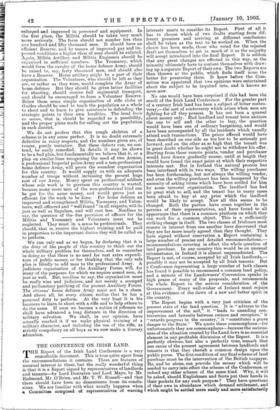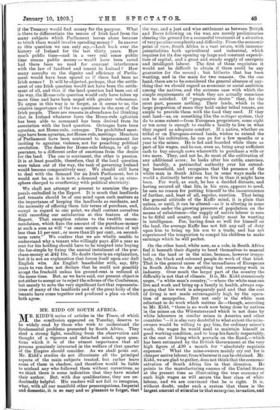THE CONFERENCE ON IRISH LAND. T HE Report of the Irish
Land Conference is a very remarkable document. This is true quite apart from the recommendations it contains. There are features of unusual interest in these, but the really wonderful thing is that it is a Report signed by representatives of landlords and tenants—by Lord Dunraven and Lord Mayo, by Mr. Redmond, Mr. O'Brien, and Mr. T. W. Russell—and that there should have been no dissentients from its conclu- sions. We are familiar with what usually happens when a Committee composed of representatives of warring interests meets to consider its Report. First of all it has to choose which of two drafts starting from dif- ferent premises and arriving at different conclusions shall be taken as the text to be worked on. When the choice has been made, those who voted for the rejected draft set themselves to get as much of it as the majority will accept introduced into the final Report. It is seldom that any great changes are effected in this way, so the minority ultimately have to content themselves with draw- ing up a separate Report of their own. The two Reports are then thrown at the public, which finds itself none the better for possessing them. It knew before the Com- mittee was appointed that two opinions were entertained about the subject to be inquired into, and it knows no more now.
No one would have been surprised if this had been the result of the Irish Land Conference. For the greater part of a century Irish land has been a subject of bitter contro- versy,—the sort of controversy which arises when men are fighting for all they possess. It has not been a quarrel about money only. Had landlord and tenant been anxious the one to sell and the other to buy, the question would have been one of ordinary bargaining, and would i have been accompanied by all the incidents which usually attend such transactions. The prices offered would have been described on one side as too low to be seriously put forward, and on the other as so high that the tenant was in great doubt whether he ought not to withdraw his offer. Starting from these remote points, vendor and purchaser would have drawn gradually nearer, until at length they would have found the exact point at which their respective interests met. But in Ireland. this natural process has been interfered with in two ways. The willing purchaser has been forthcoming, but not always the willing vendor, and even the willing purchaser has been hampered by the necessity of asking terms which have been settled for him by some terrorist organisation. The landlord has had no great wish to sell, and the tenant has in many cases been afraid to buy at any price which the landlord would be likely to accept. Now all this seems to be changed. Both the parties have come together in the persons of their representatives, and have found to all appearance that there is a common platform on which they can work for a common object. This is a sufficiently striking change in itself. The two classes of Irishmen most remote in interest from one another have discovered that they are far more nearly agreed than they thought. They have signed without reservation a Report containing as large number of precise and detailed recommendations,— recommendations covering in effect the whole question of land purchase. In any country this would be an unusual circumstance, in Ireland it is almost unprecedented. The Report is not, of course, accepted by all Irish landlords,— possibly it may not be accepted by all Irish tenants. But a, Conference representing a large number of both classes has found it possible to recommend a common land policy, and a minute of the Landowners' Convention speaks in high praise of many of the proposals, and recommends the whole Report to the serious consideration of the Government. Every well-wisher of Ireland must rejoice at this evidence of the dawn of a new and better spirit, in the country.
The Report begins with a very just criticism of the present state of the land question. It is " adverse to the improvement of the soil," it " leads to unending con- troversies and lawsuits between owners and occupiers," it "retards progress in the country," it "constitutes a grave danger to the State." We quote these commonplaces—for unfortunately they are commonplaces—because the serious- ness of the situation created by the Land-laws is an essential element in any profitable discussion of the Report. It is a perfectly obvious, but also a perfectly true, remark that one cause of the present agreement between landlords and tenants is that they cherish a common design upon the public purse. The first condition of any final scheme of land purchase must be the intervention of the British taxpayer. He, and he alone, can provide the money which will be needed to carry into effect the scheme of the Conference, or indeed any other scheme of the same kind. Why, it will be asked, should Englishmen and Scots put their hands in their pockets for any such purpose ? They have questions of their own in abundance which demand settlement, and which might be settled more easily and more satisfactorily if the Treasury would find money for the purpose. What is there to differentiate the tenure of Irish land from the many subjects which Parliament leaves alone because to touch them would involve spending money ? In answer to this question we can only say,—Look back over the history of Ireland for the last thirty years. How much public time—and in a. very real sense public time means public money — would have been saved had there been no need for constant interference with the law of landlord and tenant in Ireland ? How many assaults on the dignity and efficiency of Parlia- ment would have been spared us if there had been no Irish scenes ? It will be objected, perhaps, that the settle- ment of one Irish question -would not have been the settle- ment of all, and that if the land question had been out of the way, the Home-rule question would only have taken up more time and have been urged with greater vehemence. To argue in this way is to forget, as it seems to us, the relative importance of the two questions in the eyes of the Irish people. There are reasons in abundance for thinking that in Ireland whatever force the Home-rule agitation has been able to command has been derived from its association with the land question. Outrages have been agrarian, not Home-rule, outrages. The prohibited meet- ings have been agrarian, notHome-rule, meetings. Members of Parliament have been sentenced to imprisonment for inciting to agrarian violence, not for preaching political revolution. The desire for Home-rule belongs, to all ap- pearance, to a different order of emotions from the desire for the land. The one is sentiment, the other is passion. It is at least possible, therefore, that if the land question were taken out of the way, the task of governing Ireland would become comparatively easy. We should still have to deal with the demand for an Irish Parliament, but it would not be, as it is now, a demand urged in an atmo- sphere charged to overflowing with political electricity.
We shall not attempt at present to examine the pro- posals embodied in the Report. It is much that landlords and tenants should be of one mind upon such matters as the importance of keeping the landlords as residents, and the necessity of offering them fair terms of purchase, and, except in regard to one point, we shall content ourselves with recording our satisfaction at this feature of the Report. That exception relates to the twelfth recom- mendation, which fixes the amount of the purchase-money at such a sum as will " at once secure a reduction of not less than 15 per cent., or more than 25 per cent., on second- term rents." We confess that we are wholly unable to understand. why a tenant who willingly pays £50 a year as rent for his holding should have to be tempted into buying the fee-simple by fixing the annual instalment of the pur- chase-money at £42 10s. No doubt there is an explanation, but it is not an explanation that forces itself upon our dull English wits. An English leaseholder with, say, fifty years to run does not declare that he could not possibly accept the freehold unless his ground-rent is reduced at the same time. But, as we have said, our present object is not either to accept or to reject the scheme of the Conference, but merely to note the very significant fact that representa- tives of many of the landlords and of the great body of the tenants have come together and produced a plan on which both agree.







































 Previous page
Previous page